Hadrian’s Wall. For me, that’s where it all started. Several childhood summers spent exploring the forts and watchtowers along the northern frontier, imaginary sword in hand. All with one eye trained north—checking for the oncoming horde.
There’s something about Ancient Rome that keeps a tight grip on our collective imaginations. As a setting, it provides a perfect playground in which to set books, films, TV shows and even video games. The historical figures from the period continue to intrigue us—especially the mad, bad emperors. Here, I’ve picked out five novels which use Ancient Rome to construct different types of stories: from pure historical dramas, to crime, to science fiction—and even included a novel written during the period itself!
I, Claudius / Claudius the God by Robert Graves
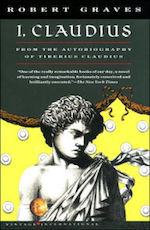 I’ll start off by cheating: these are actually two books but are often presented together, and were filmed as one for the acclaimed TV show featuring Derek Jacobi as the Emperor Claudius. Written as an autobiography—as a historian himself, Claudius is known to have written one which is now sadly lost—Graves’ book covers the period from the reign of Augustus through to the ascension of Nero. It brings to life the different characters of each of the early emperors: particularly interesting, I think, is the brooding Tiberius—an emperor whose reign tends to gets overlooked especially when compared with the more colourful rules of those that followed (i.e. Caligula!). Roman religious belief systems, and the inclusion of the prophetic Sibyl, also provide fantastical themes which run through the book.
I’ll start off by cheating: these are actually two books but are often presented together, and were filmed as one for the acclaimed TV show featuring Derek Jacobi as the Emperor Claudius. Written as an autobiography—as a historian himself, Claudius is known to have written one which is now sadly lost—Graves’ book covers the period from the reign of Augustus through to the ascension of Nero. It brings to life the different characters of each of the early emperors: particularly interesting, I think, is the brooding Tiberius—an emperor whose reign tends to gets overlooked especially when compared with the more colourful rules of those that followed (i.e. Caligula!). Roman religious belief systems, and the inclusion of the prophetic Sibyl, also provide fantastical themes which run through the book.
The Silver Pigs by Lindsey Davis
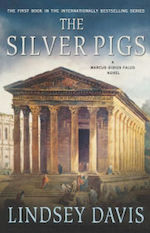 Roman novels often center on big battles that formed or defined the Empire. The Silver Pigs instead uses the Roman backdrop to set up a mystery, relating to the smuggling of silver ingots, or “pigs.” We are soon introduced to our proto-private detective—a Roman called Falco—who is hired in by the Emperor Vespasian. Of course, there was nothing like a modern police force in Ancient Rome but, just like in modern detective fiction, Falco’s investigations allow him to poke his nose into both low and high society—including forming a relationship with a woman of high birth—and thereby gives us a view of Roman life away from military camps and palaces.
Roman novels often center on big battles that formed or defined the Empire. The Silver Pigs instead uses the Roman backdrop to set up a mystery, relating to the smuggling of silver ingots, or “pigs.” We are soon introduced to our proto-private detective—a Roman called Falco—who is hired in by the Emperor Vespasian. Of course, there was nothing like a modern police force in Ancient Rome but, just like in modern detective fiction, Falco’s investigations allow him to poke his nose into both low and high society—including forming a relationship with a woman of high birth—and thereby gives us a view of Roman life away from military camps and palaces.
Romanitas by Sophia McDougall
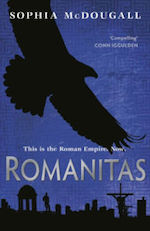 Ancient Rome has long marched successfully within the genre of science fiction and fantasy. Of course, Rome has provided a model for many alien civilizations and their rulers, but my interest centers on alternative history: what are the key moments that define our timeline, and make things as we know them? Within Romanitas, McDougall explores what the world would be like if the Roman Empire had survived to contemporary times: complete with mechanised crucifixes, magnetic railways … and the continuation of the Roman system of slavery. Part of a wider trilogy, the plot revolves around a conspiracy at the heart of the imperial system. Of course, Rome doesn’t have things all its own way, and there remain competing empires just across the water…
Ancient Rome has long marched successfully within the genre of science fiction and fantasy. Of course, Rome has provided a model for many alien civilizations and their rulers, but my interest centers on alternative history: what are the key moments that define our timeline, and make things as we know them? Within Romanitas, McDougall explores what the world would be like if the Roman Empire had survived to contemporary times: complete with mechanised crucifixes, magnetic railways … and the continuation of the Roman system of slavery. Part of a wider trilogy, the plot revolves around a conspiracy at the heart of the imperial system. Of course, Rome doesn’t have things all its own way, and there remain competing empires just across the water…
The Satyricon by Gaius Petronius
![]() No, I’m not claiming to have read this! Written in the 1st century AD, this piece of Roman-era fiction is nevertheless an important part of the jigsaw through which the society of Rome has been reconstructed. Not all of the book has survived—there are large chunks missing—but what has made it to the present day is undoubtedly both historically and culturally significant. No doubt the most famous passages relate to the feast of Trimalchio, a former slave who liked to flaunt his money (and thereby shows that “new money” is certainly no recent phenomenon). The feast includes a bizarre scene where the host “rehearses” his own funeral; inflating his ego as he stretches “dead” on a coach and watches how his guests react as he listens to their mourning. But the Satyricon also tells us something very important about Rome: it was a dynamic society. Slaves didn’t need to remain slaves; and the rich couldn’t count on remaining rich. Everyone wasn’t too far away from ending up back in the gutter.
No, I’m not claiming to have read this! Written in the 1st century AD, this piece of Roman-era fiction is nevertheless an important part of the jigsaw through which the society of Rome has been reconstructed. Not all of the book has survived—there are large chunks missing—but what has made it to the present day is undoubtedly both historically and culturally significant. No doubt the most famous passages relate to the feast of Trimalchio, a former slave who liked to flaunt his money (and thereby shows that “new money” is certainly no recent phenomenon). The feast includes a bizarre scene where the host “rehearses” his own funeral; inflating his ego as he stretches “dead” on a coach and watches how his guests react as he listens to their mourning. But the Satyricon also tells us something very important about Rome: it was a dynamic society. Slaves didn’t need to remain slaves; and the rich couldn’t count on remaining rich. Everyone wasn’t too far away from ending up back in the gutter.
Imperium by Robert Harris
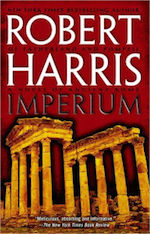 Aside from the Emperors, there’s probably no single individual from Ancient Rome that has a better known name than Cicero. In Roman fiction, however, Cicero is often presented as a secondary character. Not here, though, where he takes centre stage (albeit told through the eyes of his secretary, Tiro). The plot revolves around a courtroom battle in which Cicero made his name and, perhaps, became the most accomplished orator in history. The court case itself involves accusations that a Roman governor has overstepped his authority during his term of office, and Imperium therefore provides a great evocation of what political and social power actually meant in Ancient Rome, corruption and all.
Aside from the Emperors, there’s probably no single individual from Ancient Rome that has a better known name than Cicero. In Roman fiction, however, Cicero is often presented as a secondary character. Not here, though, where he takes centre stage (albeit told through the eyes of his secretary, Tiro). The plot revolves around a courtroom battle in which Cicero made his name and, perhaps, became the most accomplished orator in history. The court case itself involves accusations that a Roman governor has overstepped his authority during his term of office, and Imperium therefore provides a great evocation of what political and social power actually meant in Ancient Rome, corruption and all.
Top image: Centurion (2010)
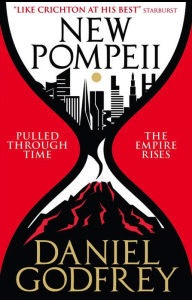 Daniel Godfrey has had several short stories published, including in My Weekly and Writers’ Forum, and is a dedicated reader of SF and historical fiction. He studied geography at Emmanuel College, Cambridge, and gained an MSc from Leeds in transport planning. He lives in Derbyshire. His first novel, New Pompeii, is out now from Titan Books.
Daniel Godfrey has had several short stories published, including in My Weekly and Writers’ Forum, and is a dedicated reader of SF and historical fiction. He studied geography at Emmanuel College, Cambridge, and gained an MSc from Leeds in transport planning. He lives in Derbyshire. His first novel, New Pompeii, is out now from Titan Books.










There’s no need to fear the Satyricon; it’s a pretty easy read if you get a good translation (though very dark in a few places).
John Maddox Roberts’ SPQR series. It’s historical mystery, enjoyable, and very well-written.
Simon Scarrow’s Eagles of the Empire series is really good.
Killer by David Drake and Karl Edward Wagner. Think Predator meets Gladiator. Really quite good.
Ancient Roman historical fiction is my favorite genre. The offerings range from cheesy pulp novels to the historically accurate and extensively researched. Perhaps my favorite novels are the Warrior of Rome series by historian Dr. Harry Sidebottom. The battle scenes in these novels are amazing.
Eagle in the Snow by Wallace Breem is a classic that sadly seems to be rarely read anymore
Obviously not a book, but I just finished rewatching the HBO series Rome, and highly, highly recommend it.
Book-wise, I love Lindsey Davis’ novels, although I haven’t read her last few yet. There’s also Thomas Harlan’s Oath of Empire series — alternate-history fantasy with the Roman empire battling the Persians, with plenty of battle mages on both sides.
And Romans also show up as antagonists in some older fiction — Robert E. Howard’s Bran Mak Morn stories, e.g., or Talbot Mundy’s Tros of Samothrace.
I was expecting something about The Golden Ass, by Apuleius. Pretty much a fantasy novel written during the Roman era. It’s very easy to read, and also pretty funny.
Nobody’s mentioned Gordianus the Finder yet?! Steven Saylor’s series starts with Roman Blood and covers the same period as Maddox’s SPQR, but is a lot more serious in tone and is probably a bit more historical. (Not that you shouldn’t read the SPQR books, too. They’re a lot of fun. Many, with Decius Metellus and Gordianus on the case Catiline never had a chance.)
Alan Smale’s Clash of Eagles is the first of an alternate history trilogy that starts when the Roman empire, still going strong in the 1200s, invades North America. The first two books never leave North America (the third book is scheduled for sometime in 2017), but the main viewpoint character is a Roman officer, with the background and military knowledge that implies.
Ranks of Bronze, by David Drake. Roman legion kidnapped by aliens and used as proxies in contract negotiations (which often see resolution on a battlefield as a sort of trial by combat).
The Belisarius Series, by Eric Flint and David Drake. Time travelers are mucking about, and the good one links up with Belisarius to defeat the bad one. It ranges all over three continents, though mostly Asia and Africa IIRC.
There are some fun mystery options, too, like the Falco series, by Lindsey Davis.
Robert Silverberg’s Roma Eterna would also qualify: in the absence of Christianity, Rome endures for much longer than in our history.
Another alternate Rome story is Poul Anderson’s “Delenda Est”, where Manse Everard of the Time Patrol encounters another surviving Rome: however, his timeline and the alternate cannot coexist. (It’s Poul Anderson, so obviously the protagonist will have to make a decision resulting in some form of tragedy…)
@@.-@: As Drake translates Ovid for fun, it’s not surprising that Drake writes good Romans. He has also done Romans IN SPACE! (Ranks of Bronze) and Romans Against Sorcery! (the Vettius and Dama stories).
I’ve also heard great things about Augustus by John Williams
Michael Livingston’s The Shards of Heaven!
For kids, Rick Riordan wrote the “Heroes of Olympus” series which has the demigod children of the Roman gods versus the Greek demigod kids. It’s set in the present day but includes lots of background on Roman life and history.
Then there’s TARZAN AND THE LOST EMPIRE by Edgar Rice Burroughs about a lost legion. I haven’t read it, but I gave it to my high school Latin teacher as a joke gift.
Ruth Downie’s Medicus series of detective novels is highly readable. The protagonist, Gaius Petreius Ruso, is a Roman Army doctor who has just arrived at his new post: Deva (now Chester), Britain. He hates it. It’s cold, damp and dreary all the time, the locals have a hate-hate relationship with their Roman conquerors, and his wife has divorced him and taken all of his money. Still, he’s a good (if curmudgeonly) guy, and this constantly gets him into trouble because he just can’t refrain from sticking his nose where it doesn’t belong.
Each volume moves at a good pace and Downie has obviously done her homework. I highly recommend it (and the audiobook is terrific, with knockout narration by Simon Vance).
No love for L Sprague de Camp’s Lest Darkness Fall? I remember this with great fondness from my misspent youth.
Jim Butcher’s Codex Alera may have started out as a joke; but it turned into six books of truly good reading; if you ever wondered what happened to Rome’s legendary “Lost Legion”.
And how about Asterix?
The Last Legion one of my favorite, sort of historic novel about the fall of Rome and it’s spiritual ancestor…sort of.
What! No love for Pompeii by Robert Harris?
No mention of the Camulod Cycle by Jack Whyte? The first book, The Skystone, starts off as the Roman Empire begins to withdraw from Britain, but the protagonist is a Roman Centurion (I think?). The first 3 or 4 books are about the transition from Roman rule, and involves quite a bit of culture changes, which I found very appealing. However, the story itself is a more “realistic” take on Arthurian myth and legend
Gibbon’s Decline and Fall was one I read in college. 8 volumes, unabridged.
The Videssos cycle of Turtledove… a sort of “early western roman republic vs late eastern roman empire with magic and names changed”.
Also, Memoirs of Hadrian by Marguerite Yourcenar. Not a hint of genre literature, but very good.
@23 ragnarredbeard: Decline and Fall is one of the most damaging hit-pieces in the field. I recommend Warren Treadgold’s A History of Byzantine State and Society as a corrective.
Thank you, NomadUK, for comment #17 regarding deCamp’s LEST DARKNESS FALL.
(Sometimes I feel pretty ancient myself, when these “five books about” posts ignore classic examples that should be unignorable….)
That’s a lot of books! Please enter me in the sweepstakes.
The Eagle of the Ninth by Rosemary Sutcliff, the young adult novel recently filmed. A young man goes north of Hadrians wall in search of the answer to the mystery of the disgraced legion commanded by his father.
I live and work a few minutes’ walk from the actual Eagle and pop in to see it from time to time. It looks more like a crow and, whatever it is, is not thought to be a legionary eagle, and anyway the fate of the legion is not a great mystery. But the story is good.
It looks more like a crow and, whatever it is, is not thought to be a legionary eagle, and anyway the fate of Legio IX Hispana is not a great mystery. But the story is good.